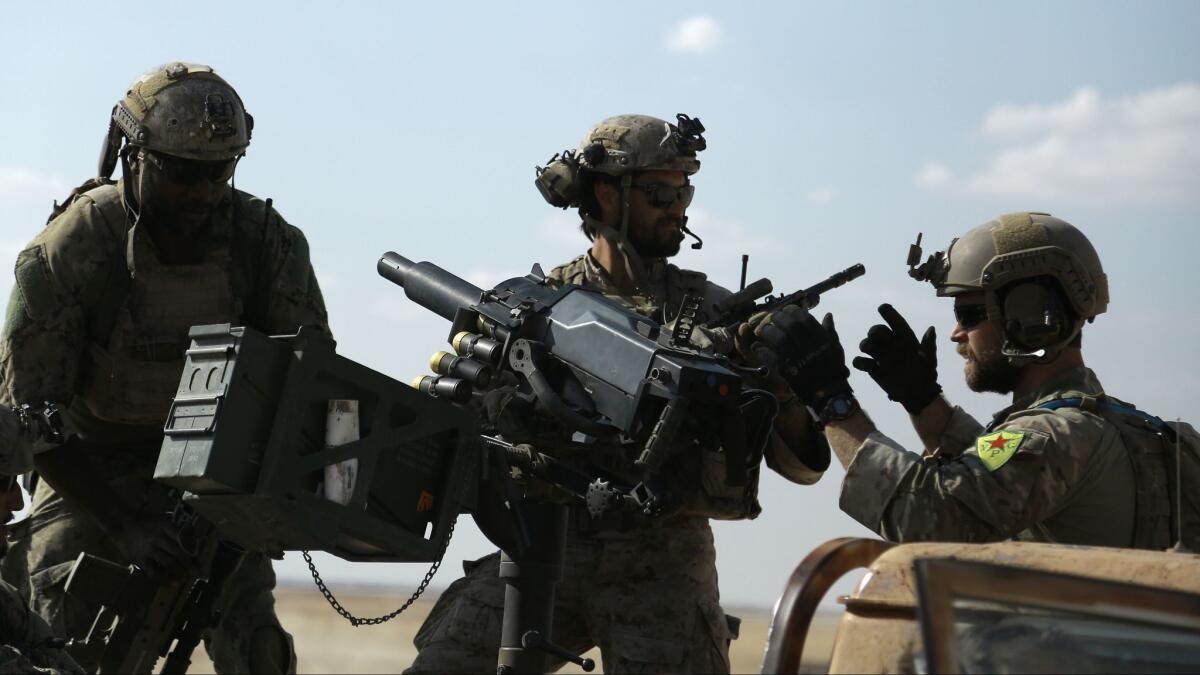Editorial: Why are we still in Syria? Trump has yet to make his case

Even though Islamic State has been all but vanquished, the Trump administration has decided to keep some 2,000 U.S. troops in Syria, partly in the hope of shaping the political future of that country. It’s a high-risk strategy that already has complicated U.S. relations with Turkey, a NATO ally, and could lead to a confrontation with Russia and the emboldening of anti-American extremists. It needs further discussion, including in Congress, which should vote on whether to authorize a continued U.S. military presence in Syria.
It was President Obama who originally involved the U.S. military in that country, after the sadists of Islamic State seized large stretches of territory there and in Iraq. To the surprise of some of his supporters, Obama ordered airstrikes on Islamic positions in both countries and deployed special forces. Even a president who had promised that “the tide of war is receding” recognized that Islamic State, if left unchecked, could pose a threat to the entire world. Obama rightly promised to “degrade and ultimately destroy” the movement, but he left office before that commitment was fulfilled.
President Trump continued and in some ways intensified Obama’s campaign against the self-styled caliphate, in alliance with the Iraqi army, Kurdish militias and Syrian Arab forces. (Shia militias backed by Iran also fought against Islamic State in Iraq.) The heartening result was that Islamic State was ousted from its strongholds in Mosul in Iraq and Raqqah in Syria and discredited in the eyes of its adherents. Isolated groups of fighters remain; this month nearly 150 Islamic State fighters were killed during U.S.-led coalition airstrikes in eastern Syria. But in both Syria and Iraq, Islamic State has lost nearly all the territory it once controlled.
In announcing this month that that the U.S. would retain a military and diplomatic presence in Syria, Secretary of State Rex Tillerson said the focus would be on “ensuring that [Islamic State] cannot re-emerge.” Given that Islamic State blossomed in Iraq after U.S. forces withdrew, that’s an understandable goal (although Iraq and Syria aren’t perfectly comparable).
But Tillerson also mentioned other U.S. objectives: preventing Syrian President Bashar Assad from fully restoring his authority over the country, countering Iran’s influence in Syria, thwarting Al Qaeda, ensuring that Syria is free of weapons of mass destruction and helping refugees to return. It’s not clear that a continued U.S. presence will produce any or all of these results. In the past, the United States’ attempts to pressure Assad to step aside have been singularly ineffective, and the presence of U.S. forces hasn’t succeeded in dislodging him up to this point.
At the same time, the U.S. military’s alliance with a Kurdish militia in Syria has led to a confrontation with Turkey, which regards the Kurdish faction as a terrorist group and has launched an offensive against it. Last week Trump urged Turkey “to exercise caution and to avoid any actions that might risk conflict between Turkish and American forces.” Trump was right to want to protect U.S. service members, but the tensions are likely to persist as long as U.S. forces are on the ground.
Tensions are likely to persist as long as U.S. forces are on the ground.
The original deployment of U.S. forces to Syria — a sovereign state that did not invite our participation — was justified by the unique emergency created by the inhuman acts of Islamic State. Now that the so-called caliphate has been “degraded and destroyed,” continued military involvement in Syria must be justified on other grounds. So far the Trump administration has not made the case.
It must do so, not only to the American public, but also to Congress. Addressing the Trump administration’s Syria policy, Sen. Cory Booker (D-N.J.) and Oona A. Hathaway, a law professor at Yale, recently wrote: “For several decades now, Congress has gradually ceded its war authority to the executive branch. If it does not act now, it may lose what authority remains. Congress has to attend to its constitutional duties: Our troops and their families deserve a public debate over the precise scope of their mission if we’re asking them to put their lives on the line.” We agree.
When Trump changed his mind and decided to continue the U.S. military involvement in Afghanistan, he addressed the nation to explain his reasoning. He should do the same on this issue — and then ask Congress for approval.
Follow the Opinion section on Twitter @latimesopinionand Facebook
More to Read
A cure for the common opinion
Get thought-provoking perspectives with our weekly newsletter.
You may occasionally receive promotional content from the Los Angeles Times.






